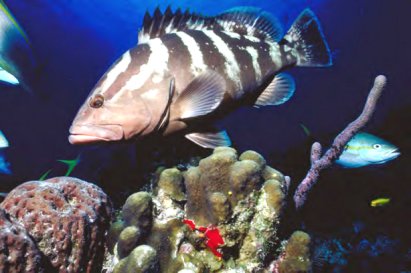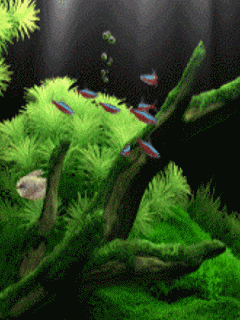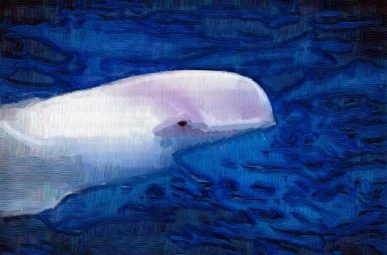|
FISHES OF THE BIBLE
 Like birds of a grosser atmosphere, fishes swim in the sea. They have eyes which are typical of dullness, rude ears, adapted only to the coarsest discrimination of sounds; for wings they have fins, and their feathers are horny scales. They are exceedingly prolific; but when they have deposited their eggs in suitable places they rarely take further thought for their young. They are mostly carnivorous and voracious, feeding upon insects, mollusks, little fishes, and any living creatures which they can swallow. Like birds of a grosser atmosphere, fishes swim in the sea. They have eyes which are typical of dullness, rude ears, adapted only to the coarsest discrimination of sounds; for wings they have fins, and their feathers are horny scales. They are exceedingly prolific; but when they have deposited their eggs in suitable places they rarely take further thought for their young. They are mostly carnivorous and voracious, feeding upon insects, mollusks, little fishes, and any living creatures which they can swallow.
The water in which fishes live is a representative of a natural atmosphere of thought relating to the world and to practical life in it. The air, called in ancient languages by the same name as the spirit, corresponds to truth concerning spiritual life, the spiritual states of men, the spiritual world, and the Lord; but water, in its best sense, as the water of baptism, represents truth by which the practical life is cleansed—truth which distinguishes between right and wrong in act.
Such truth applied more generally, yet rightly, becomes the truth of what is practicable or impracticable, possible or impossible; it is an atmosphere of physical truth concerning the world with all its products and phenomena. Applied unjustly, it is an atmosphere of merely natural thought which extinguishes or drowns affections for thinking and living spiritually. The fishes which swim in this mental sea are affections for thinking naturally.1 The good among them love scientific knowledge because of its truth and for the sake of its use; the bad love their own natural intelligence and intellectual aggrandizement. The insects upon which they live are affections for the impressions or experience of the senses, which are the natural food for the love of knowledge; and it is as inevitable that broader scientific minds should comprehend the lesser, and absorb the results of their labors, as that great fishes should swallow the small.
It was commanded the children of Israel that they should eat of the fishes which had fins and scales; but that all other animals living in the water should be unclean to them.2 With their fins fishes take hold of the water, and support, balance, and guide themselves in it. Fins represent, therefore, the hold of the mind upon natural truth, with the power and the love of thinking in it. They have this faculty, represented by fins, who are able to sustain themselves in natural thought, in a position to see clearly whether ideas of natural things are true or not. Scales are the clothing of fishes; and as sheep’s clothing represents the expressions of innocence and neighborly love which characterize the followers of the Lord, so the scales of fishes represent the expressions of love for truth and of respect for the usefulness of it, professed by honest seekers for truth in every department of natural knowledge.
Among the affections for physical truth, those are serviceable to spiritual life, and are food for the spiritual man, which have power to think truth clearly, and which also love truth for the good it may do. They are fishes which have fins and scales. (Apocalypse Explained #513. Leviticus 11:9–12.)
Besides these spiritual fishes, there are many others of strong natural intelligence but no love for use, which accumulate knowledge to no purpose, and are of no service to spiritual life. Scaleless creatures they are, some of them fierce and predaceous, and some, perhaps, harmless.
 And, again, there are those which profess the strongest regard for the usefulness of truth, and yet have no perception of what is true, but rather stir up the mud like crocodiles, in the obscurity of which they seize their innocent prey. Scales they have of the hardest; but not the slightest love for sustaining themselves in clear water. Innumerable other creatures there are in the water, infusoria, crustacea, mollusks, corresponding to mere physical aptitude for impressions and observations, or to bodily states of activity or repose, of hunger or satisfaction, quite apart from the states and desires of the mind. These are not in themselves food to the spiritual mind, but they are to affections for physical knowledge. And, again, there are those which profess the strongest regard for the usefulness of truth, and yet have no perception of what is true, but rather stir up the mud like crocodiles, in the obscurity of which they seize their innocent prey. Scales they have of the hardest; but not the slightest love for sustaining themselves in clear water. Innumerable other creatures there are in the water, infusoria, crustacea, mollusks, corresponding to mere physical aptitude for impressions and observations, or to bodily states of activity or repose, of hunger or satisfaction, quite apart from the states and desires of the mind. These are not in themselves food to the spiritual mind, but they are to affections for physical knowledge.
And besides these there are whales, warmblooded, air-breathing, affectionate; ranging from sea to sea, and consuming immense quantities of small marine creatures. They represent affections for generalizing knowledge, themselves breathing the atmosphere of spiritual truth and believing in the divine Creator; which range with comprehensive zeal from one department of natural truth to another, finding everywhere evidences of divine origin and purpose.
Such generous affections are represented by the whales of the fifth day of creation; and innocent loves for learning natural truth of every kind, for the sake of its practical usefulness, are represented by the fishes.
A state of the world in which there is no spiritual life from charity, and consequently no living interest in even natural truth, is meant by the turning the waters of Egypt to blood, so that all the fish of the river died. Quite similar is the meaning of the following verses from Ezekiel:
Behold, I am against thee, Pharaoh, king of Egypt, the great dragon that lieth in the midst of his rivers, which hath said, “My river is mine own, and I have made myself.” But I will put hooks in thy jaws, and I will cause the fish of thy rivers to stick unto thy scales, and I will bring thee up out of the midst of thy rivers, and all the fish of thy rivers shall stick unto thy scales. And I will leave thee thrown into the wilderness, thee and all the fish of thy rivers; thou shalt fall upon the open fields; thou shalt not be brought together, nor gathered; I have given thee for meat to the beasts of the field and to the fowls of the heaven. (Ezekiel 29:3–5)
The word for “dragon” here is the same as that translated “whale” elsewhere. It is a general word for great water animals. Here the creature is said to have “scales,” and to live in the Nile, and can scarcely be any other animal than the crocodile. It represents a monstrous selfish doctrine, such as the infallibility of the Pope, which compels all lovers of knowledge to adhere to it for the sake of salvation; but which, with all its adherents, will be left in the waste places of history when the presence of the living God shall be felt among men. ( Exodus 7)
 The increase of affection for knowledge, and the renewed vitality which will be imparted to it by the influence of clearer truth concerning the Lord and heaven and the life which leads to heaven—an increase and renewal which are among the brightest signs of the coming of the Lord in our generation—are thus graphically predicted by the same prophet: The increase of affection for knowledge, and the renewed vitality which will be imparted to it by the influence of clearer truth concerning the Lord and heaven and the life which leads to heaven—an increase and renewal which are among the brightest signs of the coming of the Lord in our generation—are thus graphically predicted by the same prophet:
Afterward he brought me again unto the door of the house; and behold waters issued out from under the threshold of the house eastward. . .
Then said he unto me, These waters issue out towards the east country, and go down into the desert, and go into the sea; which being brought forth into the sea, the waters shall be healed. And it shall come to pass, that everything that liveth, which moveth, whithersoever the rivers shall come, shall live; and there shall be a very great multitude of fish, because these waters shall come thither; for they shall be healed; and everything shall live whither the river cometh. And it shall come to pass, that the fishers shall stand upon it from En-gedi even unto En-eglaim; they shall be a place to spread forth nets; their fish shall be according to their kinds, as the fish of the great sea, exceeding many. (Ezekiel 47:1, 8–10)
In the gospels, fish and fishermen are often mentioned as signifying affection for natural truth and men who possess such affection. The Lord likens the kingdom of heaven to “a net that was cast into the sea, and gathered of every kind; which, when it was full, they drew to shore, and sat down, and gathered the good into vessels, but cast the bad away” (Matthew 13:47, 48); and by the good fish He means men who have sincerely loved natural truth for the sake of doing good; who, when they die, will be ready to receive spiritual instruction in the kingdom of heaven. In essentially the same meaning, the disciples were said to fish for men, when they drew into the Church those who before had known only natural truth. But in their former occupation as fishermen, supplying fish to consumers, they represent those who love to acquire natural truth, and then, as it were gathering the fish from the seas of their own minds, teach such truth to others.
In this sense Swedenborg likens himself to the Lord’s disciples, saying that he was a spiritual fisherman, whose delight it was to learn and teach science, until the Lord called him to teach spiritual truth. And it is not unreasonable to hope that many sincere lovers of science will become equally sincere and candid teachers of the truth of heaven, when once the Lord calls and instructs them.
Author: JOHN WORCESTER 1875
|
|